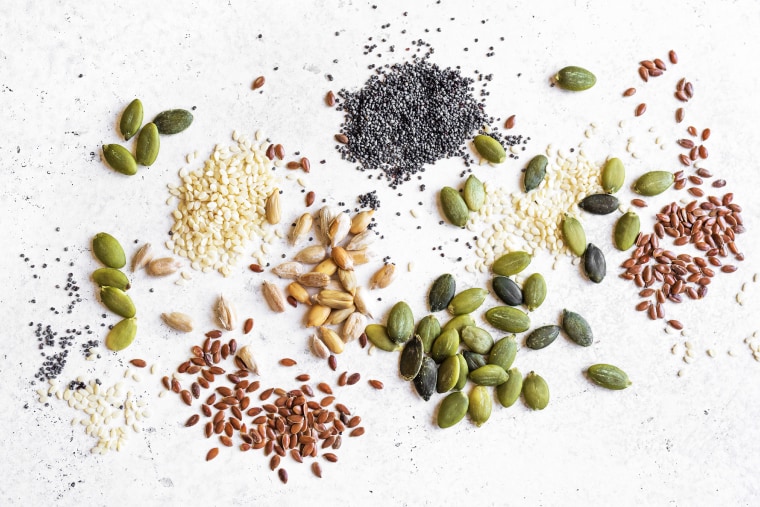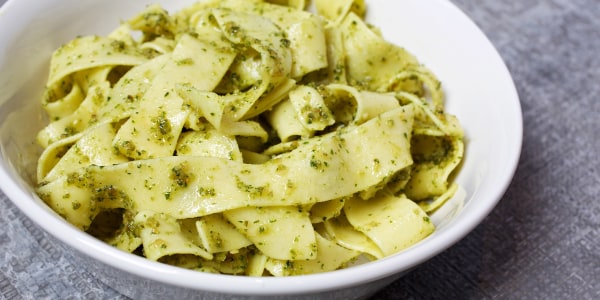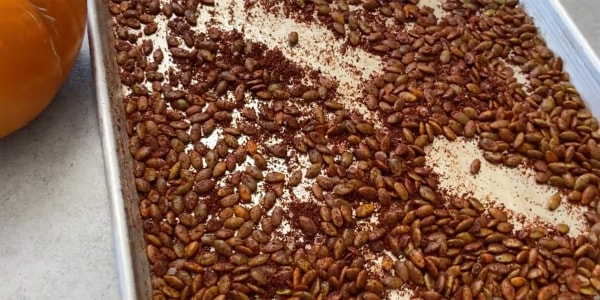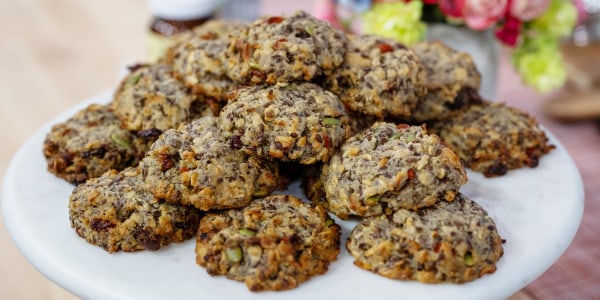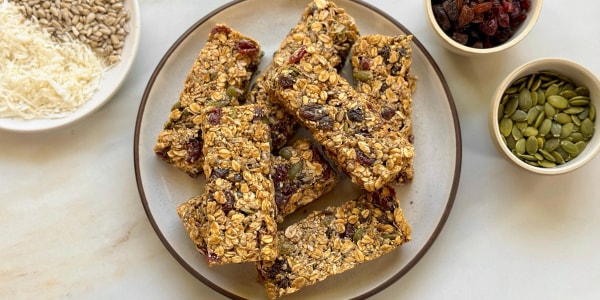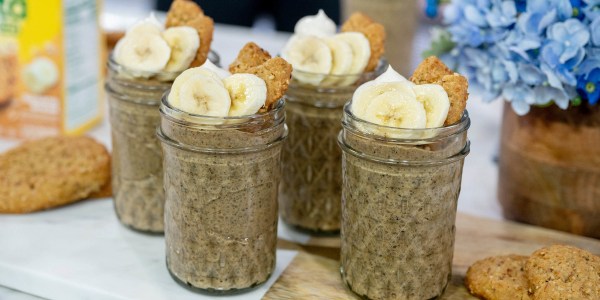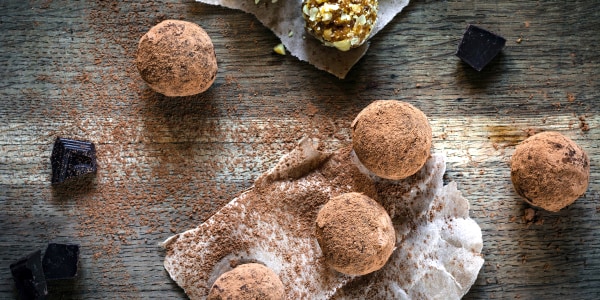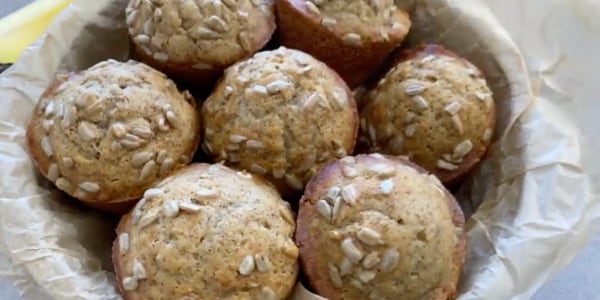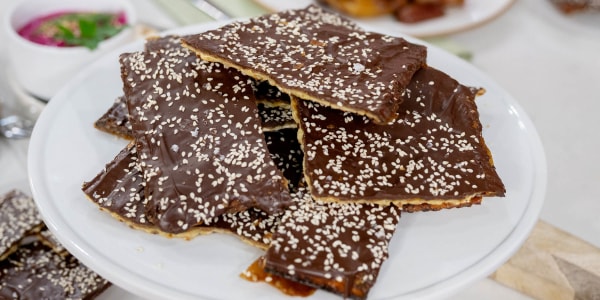Welcome to Start TODAY. Sign up for our Start TODAY newsletter to receive daily inspiration sent to your inbox — and join us on Instagram!
Seeds may look small, but they offer mighty health benefits. These nutritional powerhouses contain vitamins, minerals, fiber, protein, beneficial fats, antioxidants and other bioactive substances that protect your health. And since they are tiny, adding a sprinkle of seeds to practically any dish or snack is easy. It’s no wonder seeds are all the rage right now.
Here are some of the top seeds to add to your menu, details about what makes them so special and some fun ways to sneak them into your daily eats.
What is the No. 1 healthiest seed?
Pumpkin seeds
While every seed on this list is healthy, pumpkin seeds are truly a super seed because they benefit the body in so many ways. A one-ounce serving of unsalted pumpkin seeds has:
- 160 calories
- 8 grams of protein
- 14 grams of fat
- 4 grams of carbohydrates
- 2 grams of fiber
In addition, pumpkin seeds supply 18% the daily value of zinc, a mineral crucial for immunity, wound-healing and overall skin health. Crunchy pumpkin seeds also stand out as a top source of plant-based iron; a serving supplies 13% of your daily value for this mineral. Insufficient iron intake is common among women and kids, and for this reason, is considered a nutrient of public health concern in the United States.
Besides iron, a serving of pumpkin seeds boasts eight grams of plant-based protein and three grams of fiber. Additionally, this super-seed supplies 37% of your daily target for magnesium–a mineral that helps regulate the stress hormone cortisol, making you feel more at ease.
Pumpkin seeds are also prized for their plant sterol content. These naturally occurring compounds mimic cholesterol, so they compete with cholesterol for absorption, which may help lower your cholesterol levels.
Since pumpkin seeds are bigger than many other seed options, they are great for snacking. Here are a few other ways to enjoy them:
- Add them to oatmeal or trail mixes
- Use them to garnish soups or salads
- Sprinkle them over guac or hummus
- Place them in the food processor with cinnamon and blend until creamy for a fall-inspired pumpkin seed butter
Other healthy seeds
All seeds are nutritious and tasty; these 5 runner-ups each have a unique array of vitamins and minerals.
Chia seeds
These tiny orbs are notable for holding 12 times their weight in water and having an extraordinary amount of fiber. Nearly all the carbohydrates in chia seeds come from fiber, with an ounce providing about 10 grams or 36% of the amount needed daily. They contain soluble fiber, which acts like a “cholesterol-magnet,” latching onto circulating plaque particles and helping to escort them out of the body.
Of course, chia seeds provide vitamins and minerals, but they’re also packed with polyphenols and antioxidants. These compounds defend your cells against oxidative stress, a phenomenon tied to disease progression. These seeds also provide omega-3 ALA, an anti-inflammatory fat that may protect against heart disease. One study found that consuming a little over an ounce of chia seeds a day reduced systolic blood pressure and levels of an inflammatory marker associated with heart disease.
These super seeds have another superpower — they’re an excellent plant-based source of calcium. A one-ounce portion provides 14% of the daily value for this bone-building mineral. If you’re drinking plant-based milk or avoiding dairy products, you may be vulnerable to inadequate calcium intake, so chia seeds can help you fill the calcium gap.
Sunflower seeds
The little seed is loaded with heart-healthy fats, fiber and folate, one of the B vitamins needed to produce DNA and convert carbohydrates into energy.
These snacking seeds deserve super seed status because of their abundance of vitamin E, a nutrient that benefits the skin. A serving of sunflower seeds has nearly 40% of your daily requirement for vitamin E and selenium. Selenium is a mineral needed to repair DNA damage and protect against oxidative stress. It also possesses anti-cancer potential thanks to a process called apoptosis, which destroys damaged cells. Meanwhile, selenium is also being studied for its role in both protecting against and treating depression.
Plus, creamy sunflower butter is a terrific nut butter alternative (which is especially helpful for people with nut allergies).
Sesame seeds
You may think of sesame seeds as a garnish, but they shouldn’t be an afterthought. An ounce of sesame seeds supplies six grams of protein, three grams of fiber and about 23% of your daily magnesium requirement. Magnesium is the fourth most abundant mineral in the body, and it’s needed to regulate heart rhythm, blood pressure, blood sugar, muscle contraction and relaxation and sleep cycles.
In addition to numerous other vitamins and minerals, sesame seeds are packed with antioxidants that guard against disease-promoting cellular damage. Studies have linked them to blood pressure and cholesterol-lowering effects, and lab studies suggest they also have anti-cancer potential.
If you don’t regular use sesame seeds, try adding more tahini to your diet. This popular hummus ingredient is the ground version of sesame seeds.
Flax seeds
These small, mildly nutty seeds may be particularly good for your heart. After analyzing data from 15 studies, scientists found that supplementing the diet with various flaxseed products significantly reduced blood pressure levels. Blood pressure is considered a significant risk factor for heart disease.
Flax seeds could also be your ticket to getting more fiber — a nutrient lacking in 95% of people’s diets. Two tablespoons of flaxseeds supply about four grams of fiber, including soluble and insoluble fiber. Both types are needed to support bowel regularity and gut health.
Lignans are another bioactive plant compound especially concentrated in flax seeds; flax seeds contain up to 800 times more lignans than other plant foods. Lignans have antioxidant, anti-tumor, anti-inflammatory and antiviral properties.
There are numerous other vitamins and minerals in flaxseeds, including the plant-based omega-3 ALA. A two-tablespoon serving contains more than twice the Daily Value for ALA.
It’s better to use ground flax seeds than whole ones since the whole seeds may pass through your digestive system intact. When undigested, flax’s nutrients may not be available to you.
Hemp seeds
Just three tablespoons of these small seeds lends a whopping 10 grams of plant protein to your diet. They also supply about 50% of the daily magnesium needed, plus a slew of other nutrients, including potassium, iron and zinc.
Like some other seeds, hemp seeds are rich in plant-based omega-3 ALAs, which have an anti-inflammatory effect that can protect against heart disease and preserve your brain health. These mild seeds are also packed with antioxidants and other bioactive substances that boost your internal defenses against disease progression.
Since hemp seeds are the edible seeds from cannabis (marijuana) plants, you may wonder if they make you high. They don’t. The FDA deems hemp seeds safe and says the trace amounts of psychoactive substances naturally found in hemp seeds won’t give you a buzz.
Healthy recipes with seeds
There are so many tasty ways to add more seeds to your diet. Here are some of our favorite quick and healthy recipes.
